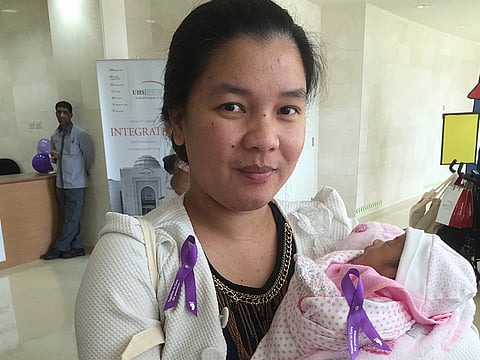10% of babies born in UAE are premature
Survival rate of 996 premature babies for every 1,000 achieved in the UAE

Dubai
About 10 per cent of all deliveries in the UAE are preterm births, an expert said on Wednesday, a day after World Prematurity Day was observed on November 17.
The day is being observed for the last five years worldwide to raise awareness about the burdens of preterm births. The World Health Organisation has revealed that 15 million babies are born premature every year, which is one in every 10 births worldwide.
“Some causes of preterm births are unavoidable, such as deformities in the uterus or sudden hemorrhages, but other causes are avoidable if mothers constantly follow up with their doctors,” said Professor Hakam Yassin, Consultant of Neonatology and Paediatrics at the University Hospital Sharjah.
From January this year, there have been 780 births at the UHS, out of which 123 were premature. Yassin said the survival rate achieved is 996 babies for every 1000 deliveries, equivalent to standards in Europe and the US.
He clarified that following up will allow gynaecologists to control mothers’ hypertension, sugar levels and treat any infections, all of which are avoidable causes of preterm births. In 2015, 23 per cent of Neonatal Intensive Care Unit (NICU) admissions were referred to the UHS by other hospitals across the country, added Yassin.
“To determine which infants fall into the premature category is simple, they are babies who are born before the 37 weeks of gestation since a full-term pregnancy is 40 weeks,” said Yassin.
He added that mild premature babies are those born at 32 to 36 weeks while the extreme premature cases involve infants born before 28 weeks. The youngest premature babies received at UHS were as young as 23 weeks old with a birth weight of around 500 grams.
“We received a mother who was transferred from another hospital because she was going into labour early and she gave birth to a 560 gram infant. After four months in the NICU, the baby went home in good condition,” said Yassin.
He also explained that several hospitals across the UAE collaborate with UHS by transferring preterm birth cases to their neonatal units. Yassin added that UHS has received several babies for the nitric oxide therapy available in their unit.
“Nitric oxide therapy is used when an increase in pulmonary artery pressure occurs which leads to a decrease in the baby’s oxygen levels,” he said. “The therapy helps dilate the arteries.”
Maria Esmeralda from the Philippines was rushed to the hospital to give birth to baby girl after a 28-week period, after she experienced excessive bleeding.
“I was transferred from Dubai Hospital to UHS and my case was handled exceptionally well,” said Maria. “My husband and I are now enjoying our healthy daughter’s company.”
Soon, UHS will add eight more beds to its NICU, providing 19 intensive care unit beds.
Sign up for the Daily Briefing
Get the latest news and updates straight to your inbox

